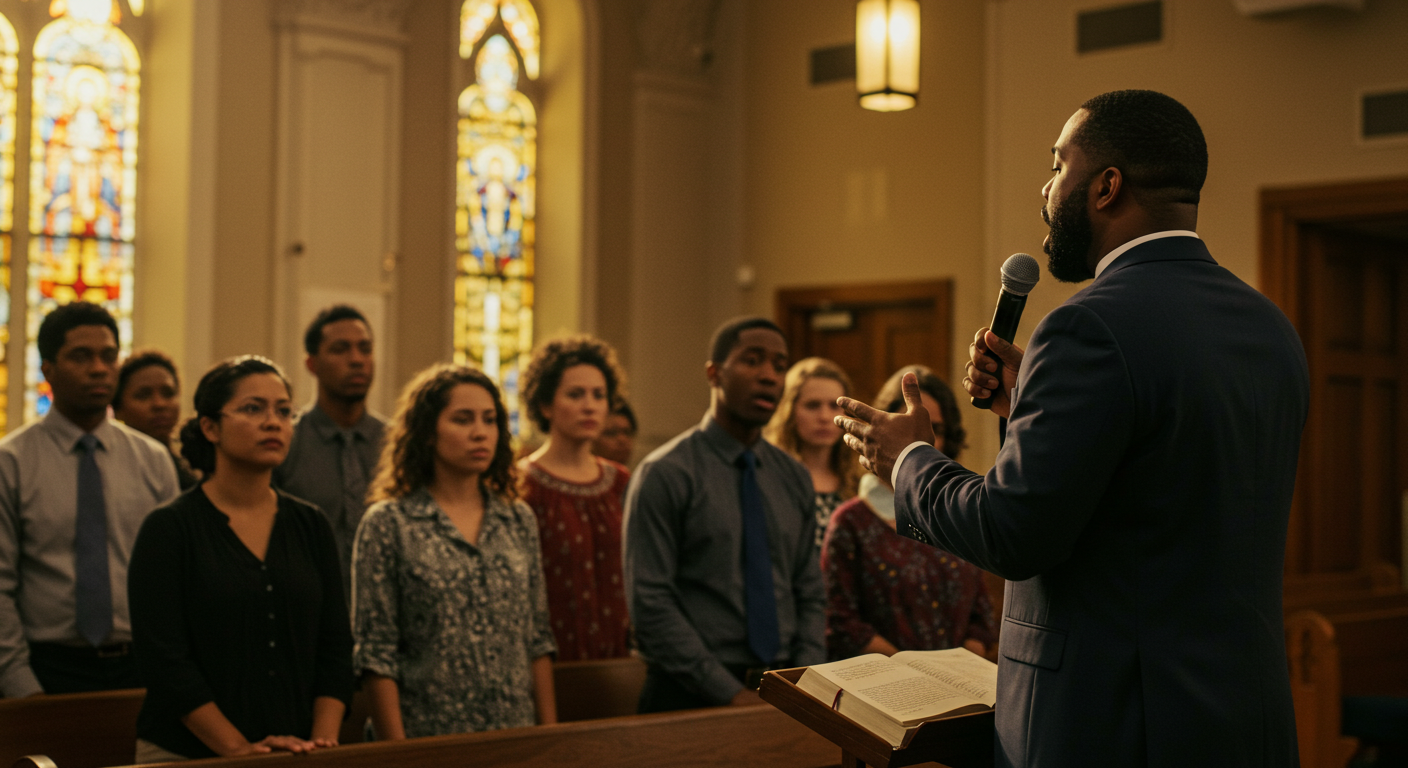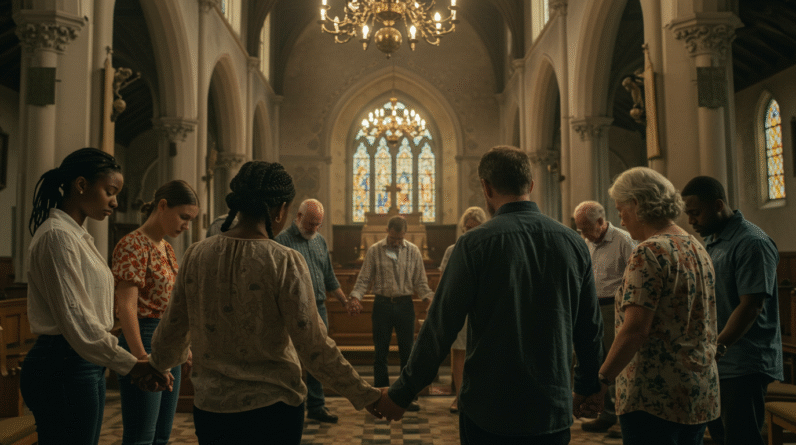Introduction: Why the Church Matters to You
You might have questions: “Do I really need the church? Can’t I grow spiritually on my own?” Those are honest questions. Spiritual growth is personal, but it’s never intended to be private. The church is the community God designed to sharpen, strengthen, and send you out. Scripture pictures the church as a body, a family, and a temple — each image showing that you and others fit together in God’s mission. When you understand the role of the church in spiritual growth, you’ll see why gathering, learning, serving, and supporting one another are central to your journey. Hebrews 10:24-25 urges believers not to neglect meeting together, but to encourage one another, especially as you see the Day approaching (Hebrews 10:24-25). That imperative shows the priority God places on communal life.
The Role Of The Church In Your Spiritual Journey
You’re walking a spiritual journey, and you weren’t meant to walk it alone. The church isn’t a building you visit; it’s a family that exists to help you become who God created you to be. In this article, you’ll see how the church helps teach the Word, provide meaningful fellowship, encourage service, and stand with you in life’s trials. You’ll also get practical next steps for engaging with your local body so your faith doesn’t become stall-speed but moves forward with purpose and momentum.
What Is the Church? A Simple Definition for You
The church is not primarily a program or a place; it’s a people — believers joined together around Jesus. Think of the church as a spiritual family where everyone has a role. You’re a member of this family whether you’ve been baptized, joined a congregation, or simply decided to follow Christ. The New Testament repeatedly calls believers a body and stresses interdependence: you have gifts and needs, and others have gifts and needs too. You were created to belong, and the church is where belonging meets growth. Paul’s image in 1 Corinthians 12 shows that the body has many parts, each needed so the whole functions well (1 Corinthians 12:12-27). That’s a vivid way to remember that the church’s role in your spiritual growth isn’t optional — it’s essential.
The Foundation: Teaching God’s Word
One of the clearest ways the church helps you grow spiritually is through teaching God’s Word. You need sound doctrine, clear explanation, and faithful application to shape your beliefs and behaviors. A healthy church listens to Scripture, preaches it faithfully, and applies it to everyday life. Paul told Timothy to entrust sound teaching to faithful people and to use the Scriptures for training in righteousness (2 Timothy 3:16-17). The church provides consistent exposure to God’s voice through preaching, Bible studies, and small groups. When you allow Scripture to teach and correct you, your life will be transformed — not merely by moral effort but by the renewing power of God’s truth. Colossians 3:16 encourages believers to let the message of Christ dwell among you richly as you teach and admonish one another with wisdom (Colossians 3:16). Teaching roots you, corrects you, and keeps your faith from drifting.
How Teaching Shapes Your Daily Choices
Teaching isn’t only for Sundays. It filters into how you parent, work, handle finances, and respond to stress. The church’s teaching helps you interpret life through Scripture, giving you godly priorities and clear ethical boundaries. When your church models faithful teaching, you gain a grid for decision-making that honors God and blesses others. You’ll find that sound teaching increases your discernment and helps you recognize spiritual traps before you fall into them.
Fellowship: You Need People Who Know Your Name
Spiritual growth happens best in the context of relationships. Fellowship is about shared life — eating together, praying together, laughing and crying together. Acts 2:42-47 describes the early church devoting itself to teaching, fellowship, breaking bread, and prayer, and it shows how the church supported one another both spiritually and practically (Acts 2:42-47). You aren’t a lone ranger. You need people who will celebrate your joys and walk with you through sorrows. In the community, your faith is tested, honed, and strengthened. You learn patience, humility, and love when you’re close to others. Fellowship is not just social; it’s sanctifying.
The Gift of Mutual Encouragement
You’ll grow when you both give and receive encouragement. Scripture calls you to spur one another on toward love and good deeds, not to isolate yourself in spiritual pride (Hebrews 10:24-25). When life gets messy — job loss, family conflict, health crises — you need people who will stand with you. Likewise, when you flourish, your testimony, gifts, and service strengthen others’ faith. That reciprocal encouragement is a powerful engine of growth.
Equipping You for Service: Gifts and Calling
One primary ministry of the church is equipping believers for service. Ephesians 4:11-13 teaches that Christ gave leaders to equip the saints for ministry so the body might be built up to maturity (Ephesians 4:11-13). You’re meant to serve — not sit in the stands as a spectator. The church helps identify your spiritual gifts, provides training, and gives opportunities to exercise them. Serving isn’t optional for spiritual maturity; it’s a formative discipline. As you serve, you discover talents, develop character, and experience the joy of contributing to God’s mission.
Practical Steps to Discover and Use Your Gifts
Start by getting involved in a ministry area and commit for a season. Ask trusted leaders to help you identify strengths and weaknesses. Participate in a small group where people can affirm and challenge you. The church often provides classes and mentorship — use them. Remember that serving changes you: it moves faith from theory to practice, and that’s how maturity is built.
The Church: A Place of Accountability and Discipleship
Growth isn’t merely accumulating information; it’s becoming more like Christ. The church provides structures for discipleship — mentoring, accountability relationships, and pastoral care. Galatians 6:2 tells you to carry each other’s burdens, fulfilling the law of Christ (Galatians 6:2). Accountability relationships keep you from spiritual drift. When you’re known by people who speak truth into your life with grace, you’ll avoid pitfalls and celebrate progress. Discipleship is intentional: it means someone invests in you and you invest in someone else. That continual investment accelerates growth in ways solo study rarely can.
Support in Trials: You Don’t Have to Suffer Alone
Hard times test your faith — but the church is meant to bear burdens with you. James encourages believers to confess sins to one another and pray for each other so you might be healed (James 5:16). When grief, health problems, or relational breakdowns hit, your church family is a place to get practical help and spiritual care. They pray, provide meals, build meals, and offer counsel. The presence of others can make suffering less isolating and more bearable. And God often uses church members as his hands and feet, bringing comfort and provision when you most need it.
Pastoral Care: Where You Find Wisdom and Presence
Pastors and elders are shepherds placed to care for you. They preach, teach, and offer pastoral counseling. While they aren’t perfect, their calling is to shepherd you through both ordinary life and crises. Don’t be afraid to seek help — pastoral care exists to carry you through seasons you can’t navigate alone.

Worship and Sacraments: Encounters with God
Worship is more than music; it’s responding to God with your heart, mind, and life. The church gathers to worship, remember baptism, and celebrate the Lord’s Supper — practices that anchor your faith. Jesus commanded his disciples to baptize and taught them to observe the Lord’s Supper as a remembrance of his sacrifice (Matthew 28:19-20). These rituals shape your identity in Christ and keep you connected to the gospel. Corporate worship reminds you that your faith participates in a larger story — the story of God redeeming the world.
How Worship Shapes Your Inner Life
When you worship with others, your affections are reoriented. Songs, Scripture readings, and creeds teach truth and form your heart. Regular worship is a spiritual discipline that realigns your priorities and produces gratitude. The sacraments are tangible ways God conveys grace and helps you remember what Christ has done.
Mission: Being Sent Together
The church isn’t inward-focused; it’s sent into the world. The Great Commission calls you to make disciples of all nations, baptizing and teaching them to obey Jesus’ commands (Matthew 28:19-20). Your local church organizes mission efforts, outreach programs, and ministries that extend God’s love to your city and beyond. When you join that mission, your faith moves from private to public. You’ll discover that serving others is one of the most reliable ways to deepen your trust in God and expand your spiritual perspective.
Practical Ways to Engage in Mission
Start locally: volunteer at a community outreach or invite a neighbor to a church event. Participate in short-term mission trips or partner with global ministries. Remember that mission is holistic — it addresses spiritual, physical, and social needs. Your involvement makes the gospel credible and shows that faith has real-world implications.
Common Obstacles You’ll Face in Church Life
You may encounter friction: hurt, miscommunication, unmet expectations, or leadership failures. These are real. Churches are made of imperfect people trying to follow a perfect Savior. The presence of brokenness doesn’t negate the church’s role in your spiritual maturation; it actually provides the context where humility, forgiveness, and grace are practiced. You’ll be tempted to withdraw when wounded, but healing often comes through staying connected and seeking reconciliation. Jesus taught about forgiveness and reconciliation because the work of discipleship happens in community.
Dealing with Disappointment Without Quitting
If you’re hurt, be honest with trusted leaders and pursue healing. Don’t let a bad season define your entire view of the church. Consider multiple churches before making a permanent decision. Some problems require leaving; many require patience, accountability, and prayer. In your discernment, ask God for wisdom and seek counsel from mature believers.
How to Grow Intentionally Within Your Church
Growth doesn’t happen by accident. You’ll grow faster when you combine personal spiritual disciplines with active participation in your church. Commit to regular worship, join a small group, find a place to serve, and get a mentor. Make Scripture part of your daily life and practice prayer both privately and with others. The church provides the context; your discipline supplies the fuel. Ephesians 4:15-16 calls believers to grow up in every way into Christ, with the whole body working together so the church builds itself up in love (Ephesians 4:15-16). That doesn’t happen by chance; it happens by choice.
A Practical Rhythm to Follow
Adopt a weekly rhythm: worship on Sabbath, study Scripture daily, meet with a small group midweek, serve monthly, and meet with a mentor quarterly. This rhythm will keep your faith active and balanced, preventing both burnout and stagnation. Small, consistent steps compound into significant spiritual transformation.

The Role of the Church in Spiritual Growth: A Summary for You
Understanding the role of the church in spiritual growth will change how you live. The church teaches doctrine, provides fellowship, equips you to serve, offers pastoral care during trials, and sends you on mission. These activities shape your character and align you with God’s purposes. When you value the church as a spiritual instrument, you’ll find your faith deepening in practical, measurable ways. Remember Paul’s exhortation that the body of Christ functions best when every member plays their part (Romans 12:4-8). Your engagement matters not just for you but for the entire community.
Practical Next Steps You Can Take Today
If you want to move forward, start small and be intentional. First, commit to attending a worship service regularly. Second, join a small group where you can be known. Third, identify a short-term serving role to use your gifts. Fourth, find a mentor or accountability partner. Fifth, practice a daily habit of Scripture reading and prayer. These steps are simple, but consistency makes them powerful. Churches are designed to walk alongside you — but you have to take the first step of showing up and offering your hands and heart.
Encouragement When You Don’t See Immediate Results
Growth is often slow. You won’t always sense dramatic changes, but spiritual maturity is marked by steady progress: increased patience, deeper love, and more faithful obedience. Don’t measure growth by feeling alone; measure it by faithfulness to daily disciplines and consistent involvement in the church. Hebrews 6 calls believers to maturity, not immaturity, and that process takes time and patience (Hebrews 6). Trust that God is at work even when you don’t see instant results.
Final Thoughts: Your Role and the Church’s Role, Hand in Hand
You and the church are partners. The church provides teaching, community, service opportunities, care, worship, and mission. You provide faithfulness, gifts, obedience, and discipleship. Together, you create an environment where spiritual growth flourishes. The phrase role of the church in spiritual growth captures this partnership: it’s not the church vs. the individual but church + individual. Commit to the shared journey, serve with humility, and receive with gratitude. The church exists to help you become more like Christ — and when you embrace that role, you’ll see God do remarkable things in you and through you.
Closing Prayer and a Practical Word
Father, thank you for placing us in a family of faith. Help you to lean into community, to teach one another, to serve faithfully, and to bear one another’s burdens. Grant you the courage to take the next step — whether that’s showing up, investing, or forgiving. Amen.
Now take one practical step this week: introduce yourself to a new person at your church, sign up for a small group, or volunteer for a ministry area for one month. Growth follows obedience.
Explore More
For further reading and encouragement, check out these posts:
👉 7 Bible Verses About Faith in Hard Times
👉 Job’s Faith: What We Can Learn From His Trials
👉 How To Trust God When Everything Falls Apart
👉 Why God Allows Suffering – A Biblical Perspective
👉 Faith Over Fear: How To Stand Strong In Uncertain Seasons
👉 How To Encourage Someone Struggling With Their Faith
👉 5 Prayers for Strength When You’re Feeling Weak

📘 Jesus and the Woman Caught in Adultery – Grace and Mercy Over Judgement
A powerful retelling of John 8:1-11. This book brings to life the depth of forgiveness, mercy, and God’s unwavering love.
👉 Check it now on Amazon
As a ClickBank Affiliate, I earn from qualifying purchases.
Acknowledgment: All Bible verses referenced in this article were accessed via Bible Gateway (or Bible Hub).
“Want to explore more? Check out our latest post on Why Jesus? and discover the life-changing truth of the Gospel!”








